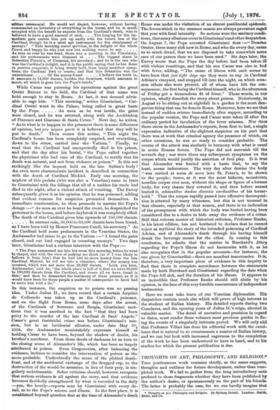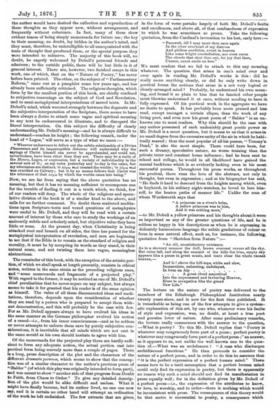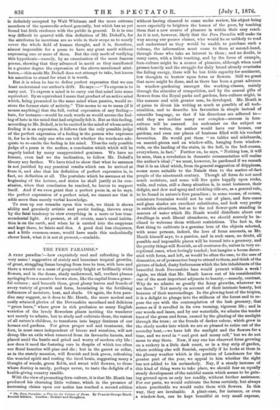THOUGHTS ON ART, PHILOSOPHY, AND RELIGION.* THIS posthumous work contains
chiefly, as the name suggests, thoughts and outlines for future development, rather than com- pleted work. We fail to gather from the long introductory note prefixed to these fragments whether they have been published by the author's desire, or spontaneously on the part of his friends. The latter is probably the case, for we can hardly imagine that
• 77soughis on Art, Philoophy and Religion. By Sydney DobelL London : Smith, Elder, and C.
the author would have desired the collection and reproduction of in the form of verse partake largely of both Mr. Dobell's faults these thoughts as they appear now, without arrangement, and and excellences, and above all, of that confusedness of expression frequently without coherence. In fact, many of them show to which he was sometimes so prone. Take the following evident traces of being simply memoranda for future use; the key to their meaning, no doubt, lay hidden in the author's mind, and they must, therefore, be unintelligible to all unacquainted with the train of thought that produced them, or the special purpose they were intended to subserve. The majority of this book will, no doubt, be eagerly welcomed by Dobell's personal friends and admirers ; to the outside public, there will be but little in it of general interest. There are, however, two finished essays in this work, one of which, that on the " Nature of Poetry," has never before been printed. The other, on the subject of " Parliamentary Reform," came out as a pamphlet some few years ago, and has already been sufficiently criticised. The religious thoughts, which form by far the smallest portion of this book, are chiefly confined to subjective reasonings on the subject of God and Revelation, and to semi-metaphysical interpretations of sacred texts. In Mr.
Dobell's mind, which wavered strangely between the dogmatic and the subjective interpretation of the Scripture, there seems to have been always a desire to attach some vague and spiritual meaning to any text he endeavoured to illustrate, and to disregard the literal interpretation. On this subject the difficulty of clearly understanding Mr. Dobell's meaning—and he is always difficult to understand—reaches its height ; the following remark, under the head of " Logos," will serve as a type of what we mean :—
" Whoever endeavours to follow out the subtle relationship of a Divine Phenomenon and its imperceptible Subclass will understand why the sayings of Christ himself can never be apprehended, and could not, nevertheless, have been other than they are. There may be a unity of the Memra, Logos, or expression, but a variety of individuality in the several acts of it ; as my voice yesterday and to-day is the same, but my utterances are distinct. '0 Mytis ogeF, created the worlds ; '0 Allyoc theal was crucified on Calvary; but it by no means follows that Christ was the utterance of that Aoyos by which the worlds came into being."
Now we are far from saying that the above quotation has no Meaning, but that it has no meaning sufficient to recompense one for the trouble of finding it out is a truth which, we think, few of our readers will deny. The whole- of the religious and specu- lative division of the book is of a similar kind to the above, and calla for no further comment. No doubt these scattered medita- tions upon Scripture-texts and vexed questions of metaphysics were useful to Mr. Dobell, and they will be read with a certain amount of interest by those who care to study the workings of an eminently subtle and scholarly mind, but objective value they have little or none. At the present day, when Christianity is being attacked root and branch on all sides, the time has passed for the metaphysical interpretation of revelation, and men are beginning to see that if the Bible is to remain as the standard of religion and morality, it must be by accepting its words as they stand, in their natural sense, and not twisting them into vague, meaningless abstractions.
The remainder of this book, with the exception of the artistic por- tion, of which we shall speak at length presently, consists in ethical notes, written in the same strain as the preceding religious ones, a►d " some memoranda and fragments of a projected play." With regard to the former, it may be noticed as one of Mr. Dobell's chief peculiarities that he never argues on any subject, but always seems to take it for granted that his reader is of the same opinion as himself. The value of all these disconnected ideas and medi- tations, therefore, depends upon the consideration of whether they are read by a person who is prepared to accept them with- out demonstration, and this will probably be the case with few. For as Mr. Dobell appears always to have evolved his ideas in the same manner as the German philosopher evolved his notion of a camel—i.e., from his inner consciousness—and as he seldom or never attempts to enforce them save by purely subjective con- siderations, it is inevitable that all minds which are not cast in the same mould as his own should hesitate to agree with him.
Of the memoranda for the projected play there are hardly suffi- cient to form any adequate notion, the actual portion cast into poetical form being scarcely more than a couple of pages. There is a long, prose description of the plot and the characters of the different dramatis persona;, which seems to show that the concep- tion wan of a similar character to the author's previous poem of "Balder" (of which this play was originally intended to form part), and was meant to show " another side of that progress from Doubt to Faith, from Chaos to Order." To give any detailed descrip- tion of the plot would be alike difficult and useless. What it might have finally become, had its author lived, no one can now say, and it is certain no other hand will attempt an ordination of the work he left unfinished. The few extracts that are given
the author would have desired the collection and reproduction of in the form of verse partake largely of both Mr. Dobell's faults these thoughts as they appear now, without arrangement, and and excellences, and above all, of that confusedness of expression frequently without coherence. In fact, many of them show to which he was sometimes so prone. Take the following quotation, from the Cardinal's invocation to his lost, early love
" Farewell, till I may meet thee once again In the clear overhead of my distress And pitiless perdition, sweet in heaven Like some bright constellation, nor even curse The clouds that shut thee out, for joy that thou, Unseen, canst smile no less."
We must confess that we fail to attach to this any meaning whatever. The question that arises in one's mind over and over again in reading Mr. Dobell'a works is this : did he• really mean anything clearly, or did he only write down in poetical forms the notions that arose in a not very logical or clearly-arranged mind ? Probably, he understood his own mean- ing, and found it so plain to him that he fancied other people must likewise understand it at once, without needing to have it fully expressed. Of his poetical work in the aggregate we have no desire to speak. It has probably been more praised and less read, except amongst a certain clique, than the work of any living poet, and even now his great poem of " Balder " is an un- known one to most readers. Why this should be the case with any author possessed of such undeniably great poetic power as Mr. Dobell is a moot question, but it seems to us that it arises in no small degree from the excessive rarity of the air in which he habi- tually soared ; thus the most popular of all his poems, " Tommy's. Dead," is also the most simple. There could have been, for such a dreamy, speculative nature, no worse training than the, private tutor and constant home influence ; had he been sent to school and college, he would in all likelihood have gained the mental backbone which is so evidently lacking even in his 1310€61 successful poems. Throughout his prose works, as throughout his poetical, there runs the love of the abstract, not only in thought, but even in expression ; and as his biographer has said, "He finds it hard to descend from the heights among which, even: in boyhood, in his solitary night-watches, he loved to lose him- self, to the beaten paths of meaner life." Unlike the man of whom Wordsworth says that "A primrose on a river's brim,
A yellow primrose was to him, And it was nothing more,"
—to Mr. Dobell a yellow primrose and his thoughts about it were as important as any of the greater questions of life, and he in seldom so happy in his descriptions as when he is expressing delicately harmonious language the subtle gradations of colour or form in some natural effect, such as, for instance, the following, quotation from " Sketches from Nature " :—
" An old, unsatisfactory existence.
As in a showery summer the dull, brown overcast covers all the sky.. But rains fall, and along the summit of the hills the blue, empty sky appears like a parse in great music, and tears clear the whole vacant heaven,— And lo ! above the hill-tops, white and slow, Immaculate, unhasting, undelayed, In form an Alp ...... . . .
. . . . A great cloud majestical Into the unpossessed and favouring Heaven, Rises to occupation like the grand
New Life."
The lecture on the nature of poetry was delivered to the members of the Edinburgh Philosophical Institution nearly twenty years since, and is now for the first time published. It is remarkable as being one of the few attempts to give a system- atic explanation of this art, by one who, whatever were his faults of style and expression, was, no doubt, at heart a tree poet and genuine lover of nature. After some preliminary remarks, the lecture really commences with the answer to the question, —What is poetry? To this Mr. Dobell replies that "Poetry is whatever may congruously form part of a poem ; perfect poetry is whatever may congruously form part of a perfect poem ;" an answer, as it appears to us, not unlike the well-known one to the ques- tion of,—What was an archdeacon ? "A man who discharges archidiaconal functions." He then proceeds to consider the nature of a perfect poem, and in order to do this he assumes that "it is the perfect expression of a perfect human mind." There seems here to be a tacit assumption that a perfect human mind could only find its expression in poetry, but there is apparently no reason why such a mind should not find its manifestation in prose equally well ; for in the definition given by Mr. Dobell of a perfect poem—i.e., the expression of the attributes to know, to love, to worship, and to order—there is nothing which would be inconsistent with prose. The consequence of this theory would be that metre is unessential to poetry, a consequence which is definitely accepted by Walt Whitman and the more extreme members of the spasmodic school generally, but which has as yet found but little credence with the public in general It is in one way difficult to quarrel with this definition of Mr. Dobell's, for the attributes he mentions are so wide in their scope as to nearly cover the whole field of human thought, and it is, therefore, almost impossible for a poem to have any great merit without expressing one or more of them. But the only mode of verifying this hypothesis—namely, by an examination of the most famous poems, showing that they advanced in merit as they manifested in a greater degree the expression of the above-mentioned attri- butes,—this mode Mr. Dobell does not attempt to take, but leaves kis assertion to stand for what it is worth.
But it is when he has to define perfect expression that we can least understand our author's drift. He says :—" To express is to carry out. To express a mind is to carry out that mind into some equivalent. By an equivalent I mean that product of an active mind which, being presented to the same mind when passive, would re- store the former state of activity." This seems to us to mean (if it means anything) that the full, verbal expression of any feeling— bate, for instance—would be such words as would arouse the feel- ing of hate in the mind that had originally felt it. But as this feeling, according to Mr. Dobell, is to be excited in the mind of whose active feeling it is an expression, it follows that the only possible judge of the perfect expression of a feeling is the person who expresses it, for he is the only one who can tell whether the words are ade- quate to re-excite the feeling in his mind. Thus the only possible fudge of a poem is the author, a conclusion which which will be eagerly hailed by many unappreciated geniuses. We have no leisure, even had we the inclination, to follow. Mr. Dobell's theory any farther. We have tried to show that what he assumes is not justified by any practical results which can be arrived at from it, and also that his definition of perfect expression is, in fact, no definition at all. The postulate which he assumes at the beginning of the lecture, and states he shall justify at its con- elasion, when that conclusion be reached, he leaves to support itself. And if we even grant that a perfect poem is, as he says, the perfect expression of a perfect mind, we cannot see that it adds more than merely verbal knowledge.
To sum up our remarks upon this work, we think it shows ability and genuinely artistic and poetic feeling, thrown away by the fatal tendency to view everything is a more or less tran- scendental light. At present, at all events, man's usual habita- tion is on the earth, and when he is carried into the empyrean and kept there, he faints and dies. A good deal less eloquence, and a little common-sense, would have made this undoubtedly clever book, what it is not at present,—readable.




































 Previous page
Previous page